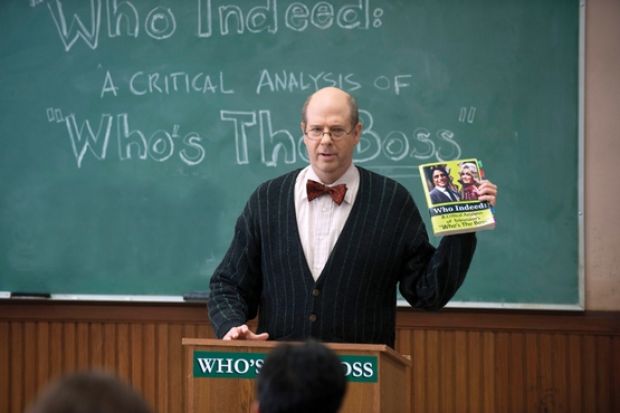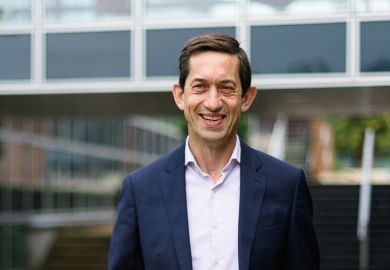Source: Getty
Old school or primary school? the styles of lecturing vary widely between cultures, but ‘there are still plenty of people who “teach” by just standing there and reading from a book’
One hand in pocket, the other waving in front: it is the “classic English lecturing style”, according to Neil McLean, head of educational development at the London School of Economics. But do this in Germany and you risk disapproving looks from students who regard the pose as too informal.
The rise of Europe’s new generation of transnationally mobile academics has thrown up a number of significant challenges.
Styles of lecturing, supervision and academic writing vary widely between cultures. So what, for example, is an Italian employed to teach in English at a German university to do? Should he or she opt for the English hand in pocket? And what will students think if their lecturer falls back on rather more Italian “hand gestures beyond the periphery of the body”?
Such issues were up for debate at a two-day seminar held at the LSE last month, Preparing Faculty for Academic, Linguistic and Intercultural Mobility, at which Mr McLean was a panel member.
The point can also be made in more general terms. Do academics on foreign soil need to adapt their “performance” as teachers or supervisors to different contexts? Are we seeing the increasing harmonisation of lecturing techniques or at least greater acceptance of the fact that individuals will have their own personal and national styles? And what are the implications of the growing dominance of “academic English”?
The event was organised by the Fiesole Group, an international network focused on thinking through what mobility means for early career academics. It was set up in 2006 in response to the needs of the Max Weber Programme for Postdoctoral Studies, at the European University Institute near Florence - the Continent’s largest postdoctoral training programme in the social sciences - “to develop teaching and research skills” and provide “a stepping stone into international academia”, as Nicola Owtram, director of the EUI’s language centre, explained to delegates.
Language professionals from higher education institutions across Europe - initially the EUI, the LSE, the Institute of Education at the University of London, Humboldt University in Berlin, the College of Europe in Bruges and the University of Siena - came together to help fellows hone their “academic communication skills”. They have since been joined by peers from the University of Oxford, Pompeu Fabra University in Barcelona and the Central European University in Budapest.
In reality, of course, it is non-anglophones who need help operating within what the Fiesole Group’s website describes as “multilingual settings in which English functions as an academic lingua franca”. A voluntary programme gives aspiring academics the chance to learn more about assessment, academic writing and applying for jobs. Initial seminars at the EUI provide “input on class management and dynamics, as well as presentation of self and clarity of communication”. Participating Max Weber fellows later undertake a week of teaching practice and observation at Humboldt, Pompeu Fabra or the LSE. Particularly useful is the opportunity to deliver the same material to two different groups of students, with detailed feedback in between to enable fellows to learn from their mistakes.
All this, argued Ms Owtram, meant that the group had been able to help develop a cadre of internationally confident early career academics “by raising awareness of the importance of language and academic discourse practices in career advancement, without having to rely on huge amounts of clunky European funding”.

Moving around to move ahead
Other speakers at the seminar explored the implications, and new policy demands, of this general picture.
Laurie Anderson, professor of English language and linguistics at the University of Siena, noted that it was one of the goals of the European Higher Education Area, which was established in 2010, to promote a knowledge-based economy by “increasing the mobility of students, academic staff and researchers within Europe” and by “increasing European research and development on a global scale”. But what would this new “transnational space”, in principle both regionalised and globalised, look like in practice?
Different forms of mobility within the EHEA, according to Professor Anderson’s analysis, posed different dilemmas for universities and those responsible for training new recruits to the academic profession.
University students on the move often required institutions “to manage [a] possible ‘disconnect’ between undergraduate education (mainly in national languages) and graduate education (increasingly in English)”. Academics going to work in a new country wanted “publishing strategies geared to career advancement” within “a common European space” that still allowed them to “re-enter [their] national systems” at a later date, as many postdocs say they would like to do.
Also up for debate, explained Professor Anderson, was the nature of “academic English”. Was it a new form of the language “co-owned” by native and non-native speakers, or did those with English as a mother tongue still have the right to decide what was and was not correct?
Theresa Lillis, professor of English language and applied linguistics at The Open University, urged delegates to think about the “price” as well as the advantages of using “English as a global resource for local knowledge- making”.
She drew on research looking at the publishing strategies of 50 scholars and graduate students in psychology and education across four European countries. In Hungary, for example, evaluation criteria within universities explicitly gave extra points for book chapters and journal articles published in a “foreign language”. This more or less invariably meant English (more than 94 per cent of the articles in the Thomson Reuters Social Sciences Citation Index are now in English).
There were also striking examples of the way that cultural factors and prejudices influence the “gatekeepers” who control access to journals.
One reviewer referred to “formulations that, in my view, are a little bit over the top and too pretentious…Maybe it is not the language but it is just too Latin for a northwest European”. Such attitudes presented a “threat to local research-building capacity” but could also lead to what Professor Lillis called “epistimicide” or “domain loss”.
Rediscovering the personal touch
There were also concerns expressed about the manner in which core academic skills are passed on. Today’s supervisors seldom take their PhD students into their homes and socialise them into research methods that way. “Learning by observing” becomes much harder in a world where many people seldom come into the office and most communication is electronic. Feedback by means of a document’s “track changes” function seldom proves very motivating.
In theory, increased academic mobility can create opportunities for outsiders to introduce fresh ideas to replace dysfunctional methods, promoting the kind of best practice the European Commission is eager to encourage.
Things often prove more complicated in practice. “There are still plenty of people who ‘teach’ by just standing there and reading from a book,” said Angela O’Neill, director of communications and languages at the College of Europe. Yet she also expected great resistance to any attempts to change this from “people who really just want to do research and find teaching a terrible chore. Autonomy is still crucial to academic life, and often used to resist any objectives other people want to impose on them.”
Yet despite all these difficulties, delegates at the LSE event also suggested ways of getting around them. One option was a series of guides for young lecturers that, without resorting to stereotypes, provided overviews, testimonies and tips about the particular challenges of teaching in, say, France or Germany. Another was a more general companion for mobile young academics to negotiate the first eight or so years of their careers.
Already in today’s LSE, there are departments where the majority of the faculty is non-anglophone. And as the “Euro-academic” becomes an ever greater feature of the higher education landscape, help will surely be at hand.
Register to continue
Why register?
- Registration is free and only takes a moment
- Once registered, you can read 3 articles a month
- Sign up for our newsletter
Subscribe
Or subscribe for unlimited access to:
- Unlimited access to news, views, insights & reviews
- Digital editions
- Digital access to THE’s university and college rankings analysis
Already registered or a current subscriber? Login




